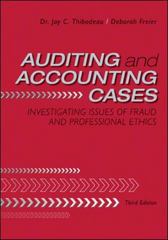FOF incorporated FOF Proprietary Funds, Ltd. (FOF Prop) as an umbrella for specialized investment accounts that were
Question:
FOF incorporated FOF Proprietary Funds, Ltd. (FOF Prop) as an umbrella for specialized investment accounts that were managed by its investment advisers.
Each of FOF Prop’s investment advisers had a duty to act in FOF’s best interests and to avoid conflicts of interest. Each was compensated based on the realized and unrealized (paper) appreciation of their portfolios.1 One of FOF’s specialized investment accounts was the National Resources Fund Account (NRFA), which was dedicated to investments in oil, gas, and mineral assets. Although no formal written agreement established the King Resources Corporation (KRC) as the investment adviser for the NRFA, FOF’s intent was to use KRC’s expertise, as it did that of other investment advisers, to locate and purchase speculative natural resource investments. FOF also had no means of valuing the assets proposed for investment and no means of participating in any of the work requirements.2 Importantly, King’s own corporate documents clearly represented that KRC was an investment adviser to FOF.
Arthur Andersen’s Relationships with FOF and KRC3 Both KRC and FOF, including its NRFA, were audited by Arthur Andersen.
Andersen also audited John King’s personal accounts. The partner in charge and the manager of the KRC audit held the same respective positions on the NRFA audit, and other Andersen staffers sometimes worked contemporaneously on the KRC and the NRFA audits. In addition, Andersen used records from KRC to perform its audit of the NRFA. Andersen’s auditors possessed minutes of an FOF board of directors meeting describing the NRFA as “essentially a discretionary account managed by King Resources Corporation.”
Andersen’s auditors themselves noted KRC’s “carte blanche authority to buy oil and gas properties for [NRC]” and its “quasi-fiduciary” duty to FOF.
Prior to the year-end 1968 KRC audit, and as early as 1966, Andersen viewed John King and his companies as a difficult client—one that posed risks to the firm itself. In fact, Andersen personnel had repeated, serious difficulties with John King as a client since at least 1961. For example, King often spoke directly with the highest echelon of the Andersen partnership in Chicago when he was displeased with the Denver office’s resolution of certain issues. Andersen also viewed FOF as presenting its own set of problems and risks.
In addition to performing a substantial amount of work on the audit of NRFA for FOF, Andersen’s Denver office had primary responsibility for the KRC audits. Therefore, Andersen’s Denver office was well aware of the advisory relationship between KRC and FOF because the relationship was described in KRC filings with the SEC. The Denver office was also aware of the lack of a written contract evidencing the terms of the relationship between KRC and FOF. In addition, it sought confirmation of the nature of any KRC–FOF agreement from KRC for the KRC audit, although it surprisingly did not seek such a confirmation from FOF with respect to the NRFA audit.
As part of its primary responsibility for the audits of the NRFA occurring after year-end 1968, the Denver office of Andersen determined the cost value of NRFA purchases by examining the books of KRC as evidential matter. Andersen reviewed the valuations set by KRC only to assess whether they were presented..........
Case Questions
1. What is auditor independence, and what is its significance to the audit profession? What is the difference between independence in appearance and independence in fact? Based on the case information, do you believe that Arthur Andersen violated any principles of auditor independence? Why or why not?
2. Consider that both KRC and FOF, including its NRFA, were audited by Arthur Andersen. In addition, Arthur Andersen audited King’s personal accounts. Do you believe these relationships impaired the independence of Arthur Andersen? Why or why not?
3. Would your answer change if different partners were assigned to both the KRC audit and the NRFA audit? Assume that both audit teams were completely different. Why or why not would your answer be different?
4. Based on your understanding of the FOF audit, do you believe these sections are needed? Why or why not? Be specific.
Step by Step Answer:

Auditing And Accounting Cases Investigating Issues Of Fraud And Professional Ethics
ISBN: 9780078110818
3rd Edition
Authors: Jay Thibodeau, Deborah Freier





